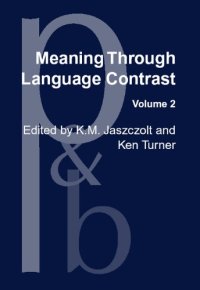
Ebook: Meaning Through Language Contrast, Volume 2
- Series: Pragmatics & Beyond New Series 100
- Year: 2002
- Publisher: John Benjamins
- Language: English
- pdf
This chapter is comparative at two levels. The first concerns whole language families, or perhaps we should say, groups of languages of a similar typological type. The second level of comparison concerns two individual Bantu languages: Digo (or Chidigo) which is spoken along the Kenyan and Tanzanian coast between Mombasa and Tanga, and Fuliiru (or Kifuliiru) spoken in the eastern eastern part of the Democratic Republic of Cango.1 The focus of this study is grammaticalisation involving verbs of movement, direction and position. A distinction can be drawn between those languages in which grammaticalisation involving such verbs rapidly results in the loss of the semantic component of physical movement etc. and those languages in which such semantic change does not necessarily occur. In many Bantu languages, including Digo and Fuliiru, grammaticalisation involving verbs of movement, direction and position does not necessarily entail the loss of their lexical semantic content, which is typically the case during grammaticalisation in other languages families. Between Digo and Fuliiru there are differences both in the range of lexical sources each language utilises and also in the extent to which these source constructions undergo formal grammaticalisation. Before describing these differences in detail, I shall briefly discuss the features of grammaticalisation relevant to this study. Grammaticalisation is the process whereby a construction involving one of the lexical word classes, such as nouns, verbs and adjectives, develops into a gram, that is, a morpheme of one of the functional, or grammatical, classes, such as prepositions and TAM (tense-aspect-modality) markers. For example, verbs of movement are common sources of future tense markers. Semantically, grammaticalisation results in semantic bleaching (or generalisation) and functional dependence on associated lexical material; in relevance theoretic terms grammaticalisation involves a shift from conceptual to procedural encoding (Nicolle 1998a). Following
Download the book Meaning Through Language Contrast, Volume 2 for free or read online
Continue reading on any device:

Last viewed books
Related books
{related-news}
Comments (0)